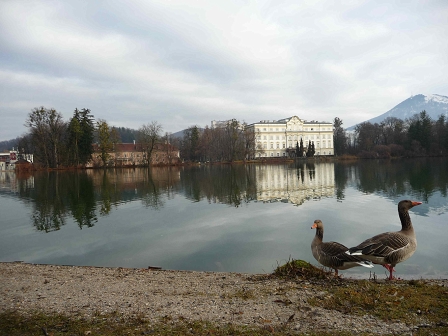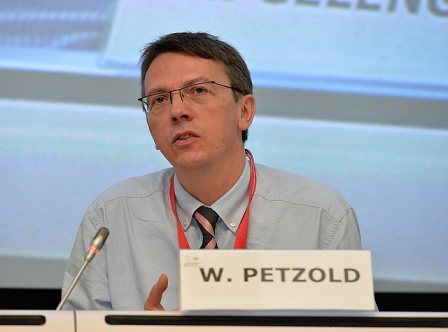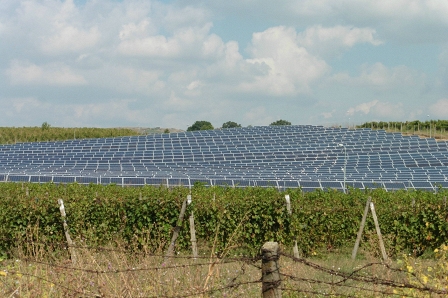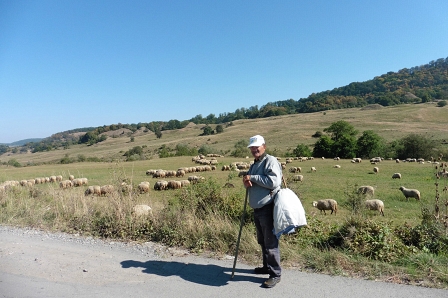Erstellt am: 4. 10. 2014 - 11:19 Uhr
Europe Must Show Some Heart
You can hear more about this on today's Saturday Reality Check Special at 12 Midday!
How do you glue the European Union together? How do you create a more equal society where people feel they have common goals and are pulling in the same direction? And how do you create a more united European society without damaging the diversity of culture that has helped define Europe for centuries?
These are tricky questions but they are questions that the EU will have to answer. Less than half of the eligible Europeans turned up to vote in this May’s EU elections and many of those who did bother to vote, gave their support to parties that want their countries to exit the project.
The only shock about this was the fact that no one was shocked. I only detected a sense of relief on my past trip to Brussels that it hadn't been worse.

Chris Cummins
If a new European Union is to be forged that engages its citizens then the planning has to start now and that's why I travelled to Schloss Leopoldskron in Salzburg. There, at a Salzburg Global Seminar pro-Europeans were plotting ways to make Europe feel more relevant to the needs of its voters. It was a moment for reflection and self-criticism.
"Too much focus on the economy"
"I think people don't feel connected to Europe because Europe doesn't connect to them," Wolfgang Petzold, of the EU Committee of the regions told me. He agrees that the EU has let people believe that it is more concerned with easing life for business than it is with addressing their concerns.
"From its very beginning over 50 years ago, Europe has been mainly focused on the interests of the economy. There have been good reasons for that. It was a peace project and they integrated the economies of France and Germany. But now we are further down the road."

© European Union/Gino De Laurenzo
Petzold says the democratic processes are still too opaque to the normal, busy citizen of the European citizen: "I think that Europe is not yet a project of the people for the people. People must have their say."
Another part of the problem is inequality. While social differences remain acute across the bloc, Europeans will feel alien to each other. So fighting inequality is fighting for Europe. That's where a Commission mechanism called the European Cohesion Fund comes into it. I asked Gabriella Fesus of the Commission to put it in a nutshell for me:
"The Cohesion Fund is the policy of the Union which aims to invest in all regions and all member states of Europe in order to stimulate growth and competitiveness and strengthen economic, social and territorial cohesion."
If that sounds like Brussels talk, Wolfgang Petzold can help with a handy simplification: "Imagine a Robin Hood at a European level who takes money away from the rich and gives it to the poor to help them catch up. That's what it is about."
A Lot of Money
The Cohesion Fund is worth 350 billion Euros over a seven year period, so it is surprising we know so little about it. It is not meant to be about easy hand-outs but rather a specifically targeted and carefully monitored stimulus programme for entrepreneurship that will create jobs in disadvantaged communities and infrastructure that will make backwaters more attractive for investment.
It's our money, so maybe we should pay some attention: "It is either the best kept secret or the worst understood of the Commission's policies," says Salzburg Global Seminar's Clare Shine, "and that's why we are here to discuss it."

Chris Cummins
To help me understand it better I traveled to Romania, one of the poorest members of the 28 nation EU bloc. As you travel through the countryside the blue European Union flags are plastered onto or flying outside all sorts of public buildings. A sign of enthusiasm for Europe and gratitude for its largesse?
In Bucharest I met Oana Hristea, a young post-graduate who told me: "These funds are coming in for different projects and things are really moving. It has been a dramatic, positive change. But we need to access them properly. The people who need the money don't have the information to the right applications to access the European Funds."
Ioana Maria, a social activist based in the Transylvanian town of Sibiu is more sceptical. Speaking not specifically about the Cohesion Fund but about EU grants in general she says: "A lot of the funding is really misused by the government. There are lots of things that are just plain wrong about the system. For example there is a lot of European funding that does not go anywhere because people just don't know about it."
She also criticises the EU's ambivalence on environmental issues and its failure to listen to the concerns of the ordinary people who want to hold on to their biodiversity and the diversity of their culture: "On the one hand they say you should build up ecotourism and support biological gardening and farming. But on the other hand they pressure us for fracking and for logging for timber and for dumping grounds for all sorts of waste." The big words about social cohesion from Brussels she says are "just words".

Chris Cummins
The lessons I learned in Romania?
Europe has to decide whether it wants act as Robin Hood or as a facilitator for big business. Until people really feel their concerns are being heard and addressed, it is likely to remain seen as a pro-market economic co-operation zone, but it will not win the hearts of the people unless it shows some heart itself.


